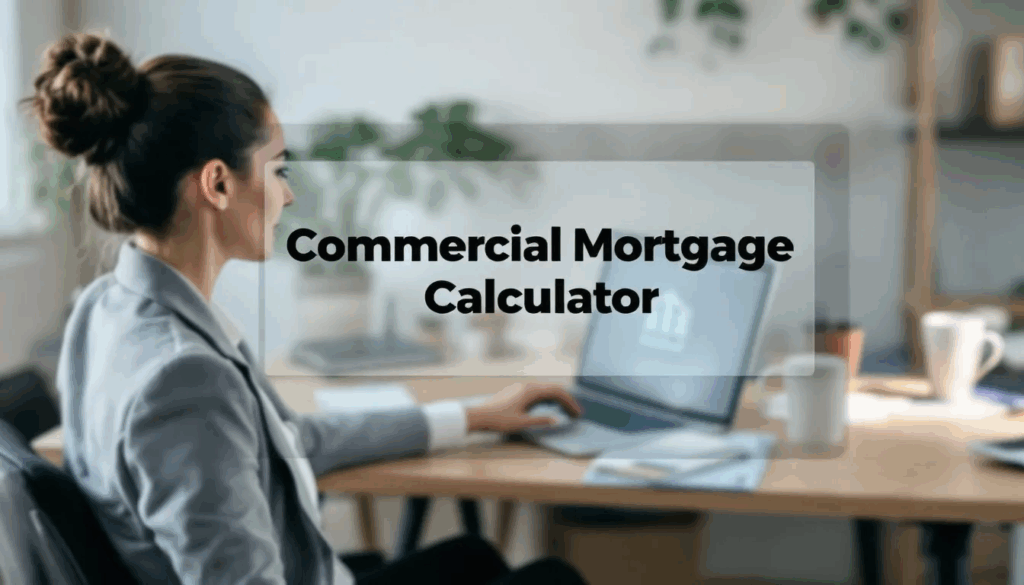What is a Commercial Mortgage?
Commercial mortgages are business loans specifically designed to help individuals and companies finance properties for business purposes. Unlike residential real estate mortgages, which are used for personal homes, commercial loans cater to the unique needs of businesses seeking to purchase or refinance properties for their operations.
These loans differ from traditional residential loans in several vital ways. When considering a commercial mortgage, lenders assess various factors, including the property’s market value, potential income generation, and the borrower’s ability to repay the loan. Lenders also consider the loan-to-value ratio, which compares the loan amount to the property’s appraised value, and assess the business credit profile to determine risk and eligibility. This tailored approach ensures businesses can secure financing that aligns with their specific requirements.
Factors Considered
When applying for a commercial mortgage, financial institutions assess different elements before approving the loan. One crucial factor is the property’s market value – this helps determine how much can be borrowed against it. Moreover, lenders consider the collateral borrowers provide as security for the loan. This could include other owned properties or valuable assets that can serve as collateral for repayment.
Lenders evaluate an applicant’s ability to repay the loan based on their business’s financial performance and stability. Lenders often review the total annual debt service, which includes all principal and interest payments due in a year, to ensure the business can meet its debt obligations. By examining these factors closely, lenders ensure that they mitigate risk while providing necessary financing to support business growth and expansion.
Importance of Collateral in Commercial Mortgages
One crucial aspect that differs between commercial and residential mortgages is the type of collateral. Lenders assess the total value of the collateral to determine how much can be borrowed and to calculate the loan-to-value ratio. While residential mortgages primarily use the home purchased as collateral, in commercial financing situations, lenders may require additional forms of security beyond the purchased property itself. Loan-to-Value (LTV) ratios in commercial lending typically range from 60% to 80%.
Loan Costs and Interest Rates
Commercial real estate financing costs include the principal, interest, and any applicable fees. The annual percentage rate (APR) reflects both the interest rate and additional fees, providing a more comprehensive view of the loan’s actual cost.
Interest rates associated with commercial mortgages often vary based on different benchmarks, such as the London Interbank Offered Rate (LIBOR). Prime rates and LIBOR are commonly used indices to determine commercial mortgage interest rates.
Commercial real estate loan rates typically range between 1.176% to 12%. The industry median interest rate for most commercial real estate loans is usually about 3% above the effective federal funds rate.
Moreover, when securing a commercial mortgage, borrowers should consider other costs associated with obtaining and servicing the loan. These may include origination fees, appraisal charges, legal fees, and title insurance costs, among others, which contribute towards making up loan costs.
Types of Commercial Real Estate Loans
| Loan Type | Typical Interest Rate | Term Length |
|---|---|---|
| Traditional Commercial Loan | 5% – 7% | 5 – 20 years |
| SBA 504 Loan | Around 3% – Prime + 4.75% | 10 – 25 years |
| Bridge Loan | 4.2% – 13% | 6 – 24 months |
| Hard Money Loan | 10% – 18% | 1 – 3 years |
| Construction Loan | Varies by lender | 1 – 3 years |
| Conduit Loan (CMBS) | Competitive fixed rates | 5 – 10 years |
Choosing a Commercial Mortgage
Selecting the right commercial mortgage is a pivotal step for any business or investor looking to finance commercial real estate. With a variety of loan options available, it’s essential to match your financing to your business’s unique needs and long-term goals.
Avoiding Common Mistakes in Commercial Mortgage Financing
Navigating commercial mortgage financing can be complex, but avoiding common mistakes can save your business time, money, and stress. One of the most common errors is failing to review the loan terms and conditions thoroughly. Before signing, make sure you fully understand the interest rate, loan term, amortization period, and debt service coverage ratio associated with your commercial mortgage.
Another pitfall is neglecting cash flow management. Insufficient cash flow can lead to missed payments and even default, which can damage your credit history and jeopardize your property. Overleveraging—borrowing more than your business can reasonably repay—is another risk that can strain your finances.
How do Commercial Real Estate Loans work?
Small business owners have several options for financing a commercial property acquisition or renovation. The general process includes:
- Determine how much you need for the property
- Find the best loan option and commercial mortgage terms to suit your needs
- Find a commercial real estate lender
- Ensure you qualify
- Apply with the lender
- Accept the loan offer if approved
- Repay the loan per the agreement
Borrowers have several options to finance the acquisition, renovation, or construction of a commercial property. Commercial mortgages typically have terms ranging from 3 to 25 years, depending on the type of loan. Some loan structures allow for interest-only payments, which can lower monthly costs but require a large balloon payment at the end of the loan term. Other options offer equal monthly payments. The exact conditions depend on the lender and the specific loan type.
Traditional Commercial Mortgage Loans
Banks and credit unions provide conventional commercial mortgages secured by the property. Borrowers typically require a strong credit history, a personal credit score of at least 680, and a proven track record of successful business operations. Fixed-rate loans are the standard in this category, offering consistent payment terms throughout the life of the loan. For many commercial loans, the initial payments cover a larger portion of interest compared to the principal.
Small Business Term Loans
Business term loans from alternative lenders provide funding from $10,000 up to $5 million, with terms ranging from 3 to 10 years. Interest rates typically start around 5%. These loans are an option for small business owners who may not qualify for traditional bank financing.
Premanant Loans
Permanent loans provide long-term, fixed-rate financing for stabilized, income-producing properties, typically with terms from 5 to 20 years. Specialized loan products are also available for investment properties purchased for income generation or resale, such as those acquired, flipped, or leased to maximize profits. Personal guarantees may be required for certain commercial loans if the borrower lacks sufficient credit history.
Small Business Administration (SBA) Loans
SBA commercial real estate loans are designed to help small business owners acquire, renovate, or expand commercial properties with favorable terms that may not be available through conventional financing. SBA loans offer long-term, low-down-payment options, helping to reduce default risk for lenders and making it easier for business owners to access the capital they need.
SBA 504 loans are tailored for purchasing fixed assets, including commercial real estate and large equipment, with terms up to 25 years. Borrowers can access up to $5 million, often with lower down payments and fixed interest rates, making this loan ideal for owner-occupied commercial properties. This program pairs a loan from a Certified Development Company (CDC) with a conventional bank loan, allowing borrowers to preserve working capital while financing significant investments.
SBA 7(a) loans provide flexible financing that can also be used for commercial property purchases, renovations, or expansions, with terms generally ranging from 10 to 25 years. These loans are more versatile than SBA 504 loans, supporting a wider range of business needs, including working capital, equipment, and debt refinancing. SBA 7(a) loans help small business owners secure financing even when they may not qualify for conventional bank loans.
Bridge Loans
Bridge loans are short-term financing options, typically lasting 6 to 24 months. They are often used to compete with cash buyers and secure properties quickly.
Hard Money Loans
Hard money loans are private loans with short repayment terms and higher interest rates (10–18%). They are primarily secured by real estate and often have lenient credit requirements.
Conduit Loans
A first-position mortgage backs conduit loans and involves pooling multiple mortgages into a trust. They are commonly securitized into commercial mortgage-backed securities (CMBS) and are often used for investment properties, such as retail centers, offices, and hotels. Conduit loans allow lenders to diversify risk across a portfolio of properties while providing borrowers with competitive financing options.
Construction Loans
Construction loans fund the building or renovation of commercial properties over short terms of 1 to 3 years. These loans are typically interest-only during the construction period, with full principal repayment or conversion to permanent financing upon completion of the project.
CMBS Loans
CMBS loans are backed by commercial mortgage-backed securities, which pool multiple commercial mortgages. This structure allows lenders to diversify risk across the portfolio while providing borrowers with access to financing for larger or multiple-property investments. Terms and payment structures are similar to those of conduit loans, often featuring interest-only periods followed by balloon payments.
Commercial Mortgage Refinancing Loan
Refinancing is the process of paying off an existing loan with a new loan. Many commercial lenders will require a debt service coverage ratio to determine the borrower’s ability to repay the loan after refinancing. Lenders often conduct background checks on the property and the borrower’s financial history during the refinancing process.
Understanding Amortization Schedules and Balloon Payments
Amortization is a method of debt repayment where fixed payments are made on a prearranged schedule. In a typical amortization schedule, the payments are divided between principal and interest, with interest decreasing and principal increasing over time. The amortization schedule helps borrowers visualize how much of each payment goes towards principal and interest over time.
Some commercial loans are partially amortizing, meaning borrowers make regular payments but must pay a balloon payment—a lump sum due at the end of the loan term. Borrowers must plan carefully for balloon payments, as these can significantly impact finances if not budgeted. In partially amortizing loans, the amortization period is longer than the term of the loan, requiring a lump-sum balloon payment at its maturity.
Managing Cash Flow with a Commercial Mortgage
A commercial mortgage calculator is a valuable self-help tool for estimating your monthly payment and planning cash flow. Maintaining a healthy DSCR is critical, and lenders prefer businesses that have been operating for at least 2 years.
How do I qualify for a Commercial Mortgage?
Lenders evaluate your personal credit history, business credit, loan-to-value ratio, DSCR, and financial statements. Most commercial lenders prefer borrowers with a personal credit score of at least 680 and require down payments of 20%–30%.
Rigorous Underwriting
The underwriting process for commercial financing is much more rigorous than that of residential mortgages or business loans. Unlike residential loans, where lenders mainly consider personal credit scores and income, commercial mortgages require an in-depth analysis of the borrower’s finances and the business property used as collateral.
When evaluating your application, lenders also consider factors like median interest rates, amortization schedules, and collateral. These details help them assess the level of risk involved in lending to you.
Most commercial lenders prefer borrowers with a personal credit score of at least 680 for approval of commercial loans. A business is required to occupy at least 51% of the property to qualify for a commercial mortgage.
How do I use a Commercial Mortgage Calculator?
Mortgage calculators can provide payment amounts for principal and interest, interest-only, and balloon repayments. Most mortgage calculators give a preliminary estimate and do not account for variable interest rates that may change over time. While using a commercial mortgage calculator, it is important to include costs such as property taxes, insurance, maintenance, and lender fees in the overall budgeting process.
You can use the following Commercial Loan Calculators:
- CommLoan‘s Commercial Mortgage Calculator
- MortgageCalculator.org’s free tool
- Business.org‘s Commercial Mortgage Calculator
A commercial loan calculator is a helpful tool for estimating the costs associated with obtaining a commercial mortgage. By entering details such as interest rates, amortization period, and loan amount, you can calculate your monthly payments, the total interest paid over the life of the loan, and other relevant financial information. The calculator can also help you estimate your mortgage payment and see how adjusting the loan term or refinancing could result in lower monthly payments. This allows you to have a clear understanding of what to expect in terms of financial obligations when seeking a commercial mortgage.
Commercial mortgage calculators are handy for comparing different commercial financing options. For instance, if you’re considering multiple loan offers from other lenders, using a calculator can help you compare the total costs of each loan, making it easier to choose the most favorable option. These calculators can help you understand how changes in variables, such as median interest rates or amortization periods, may impact your overall loan costs. The maturity date is the date on which a loan’s final principal payment is made, after which no further interest is accrued.
Impact on Decision-Making
Understanding the potential impact of different variables through a commercial mortgage calculator empowers borrowers during the decision-making process. For example, by adjusting inputs such as interest rates or amortization periods within the calculator, borrowers can see how these changes affect their monthly payments and overall repayment amounts. Commercial mortgage calculators can also be used to compare the costs and terms of two loans side by side, helping borrowers make informed decisions about which loan structure is most suitable for their needs. This insight is valuable when navigating different business loan options and determining which aligns best with their financial goals.
Moreover, commercial mortgage calculators also provide clarity on how certain factors may influence specific aspects of loans — such as balloon payments or adjustable-rate mortgages — making it easier for borrowers to comprehend the complex elements involved in securing commercial financing.
Factoring the Closing Costs
When securing a commercial real estate loan, it’s essential to factor in closing costs—fees and expenses that are due upon loan finalization. These costs can add up quickly and vary depending on the loan amount, property type, and lender, so it’s crucial to factor them into your overall budget.
How to apply for a Commercial Real Estate Loan:
You can apply for a commercial real estate loan through our network of lenders, utilizing an SBA loan or a business term loan. Follow these steps to apply.
Step 1: Ensure You Qualify
You’ll need a personal credit score between 650 and 700, as well as a healthy and consistent cash flow. You will also need documentation of the property you’re interested in, such as the address, property type, owner-occupancy ratio, total sale price, plans to renovate, and a list of revenue-generating tenants (if any).
Step 2: Gather Your Documents
Be prepared to provide:
- Driver’s License
- Business license or certificate
- Voided Business Check (for business bank account information)
- Bank Statements
- Credit Report/Statement of Personal Credit History
- Business Tax Returns
- Credit Card Processing Statements
- Personal Tax Returns – 3 Years
- Business Tax Returns – 3 Years
- Business Plan (Not in all cases)
- Personal Financial Statement
- List of Real Estate Owned or Business Leases, if applicable
- Debt Schedule/Loan/Rent/Lease Documentation
- Deeds/Title/Ownership documentation for any collateral/Security
- Current Profit & Loss Statements and Balance Sheet Year-to-Date
- A/R and A/P Reports
- United Capital Source 1 Page Application
Step 3: Fill Out the Application
You can begin the application process by calling us or filling out our one-page online application. Either way, you’ll be asked to enter the information from the previous section along with your desired funding amount.
Step 4: Speak to a Representative
Once you apply, a representative will contact you to explain the repayment structure, rates, and terms of your available options. This way, you won’t have to worry about surprises or hidden fees during repayment.
Step 5: Receive Approval
Commercial Real Estate Loans through our network generally take 3-5 weeks to process. Once approved and your file is closed, funds should appear in your bank account in a few business days.
If and when approved for a business term loan, funds should appear in your bank account in 1-2 business days.
What are the benefits of a Commercial Real Estate Loan?
Getting a loan for a business property can help small businesses buy the buildings or land they need. This property becomes an asset that enhances the company’s overall value, particularly once the loan is paid off.
Owning the place where you do business gives you more freedom to make changes. You can put up signs, add equipment, or make other changes without asking permission from a rental company.
You must use most of the property for your business, but you can rent out the rest for extra money. For example, if you bought an office building, you must use at least 51% of it for your business, but you can rent out extra office space to other companies.
There are lots of lenders and loan options for a business mortgage. You can get a low-cost SBA loan or use an online lender for a quick application and fast funding.
What are the drawbacks of a Commercial Real Estate Loan?
Taking out a significant business loan carries inherent risks. If you can’t repay it and default, your business and personal assets may be at risk.
Most lenders need a significant down payment for commercial real estate loans. You might have to put down 25% of the price or just 10% for SBA loans. Sometimes, you’ll need to add additional collateral or a personal guarantee to secure the loan.
Applying for a commercial loan can be time-consuming, especially for traditional loans. SBA loans are primarily known for being hard to get. You need a good credit score, at least two years in business, and high yearly sales to qualify for most loans.
Some small businesses may struggle to comply with these rules. If you don’t get an SBA loan, most commercial real estate loans last 5 to 10 years. But you’ll still owe the rest of the money at the end of the loan. The remaining balance is typically due on the loan’s maturity date, which is the date when the final principal payment must be made.
Commercial Real Estate Loan Pros & Cons
Pros:
- Lower interest rates compared to other types of business loans.
- Longer loan terms allow for more manageable monthly payments.
- Can be used for various purposes, including purchasing, refinancing, or renovating commercial properties.
Cons:
- Strict eligibility requirements, including high credit scores and a strong financial history.
- A larger down payment is typically required for commercial loans compared to residential loans.
- Risk of property depreciation affecting the loan’s collateral value.
Frequently Asked Questions
Here are the most common questions about commercial real estate loans and using a commercial mortgage calculator.
What types of Commercial Properties can I finance?
Business owners can finance most commercial properties if they serve genuine business purposes. Here are some of the most widely financed types of commercial properties.
Office Buildings
Business owners can utilize commercial financing options to secure loans for purchasing or refinancing office buildings. Businesses often seek these properties to establish a professional and centralized location for their operations.
Office buildings serve as the headquarters for various companies, offering spaces for administrative offices, meeting rooms, and workstations. With the help of a commercial mortgage, business owners can acquire these properties with tailored financial products from lenders and financial institutions.
Retail Spaces
Retail spaces such as shopping centers, standalone retail stores, or mixed-use commercial developments can also be financed through business loans specifically designed for commercial properties. These spaces cater to businesses that sell goods or services directly to consumers.
By leveraging commercial mortgages, entrepreneurs operating retail businesses can expand their reach by acquiring new locations or optimizing existing ones through refinancing options. The flexibility offered by different types of financial institution products allows them to choose a loan term that aligns with their growth strategies.
Industrial Facilities
When it comes to purchasing industrial facilities, commercial real estate loans can be a valuable financing option. These loans are specifically designed to help businesses acquire or refinance properties that are used for commercial purposes, such as manufacturing plants, warehouses, or distribution centers.
Which lenders offer Commercial Real Estate Loans?
Small business owners have several options for lenders when seeking a commercial mortgage. Here are some key lender types to be aware of.
Traditional Lenders
Traditional lenders such as banks and credit unions are common providers of commercial real estate loans. These lenders typically offer competitive interest rates and terms for businesses looking to purchase or refinance commercial properties.
They often require a thorough review of the borrower’s financial history, business plan, and property appraisal before approving a loan. Traditional lenders may also have stricter eligibility criteria than alternative lenders, but they can provide stability and reliability for businesses seeking financing for commercial real estate ventures.
SBA Lenders
When seeking a commercial mortgage through the Small Business Administration (SBA), it’s crucial to consider SBA lenders as potential sources of financing. The SBA approves these lenders to provide loans partially guaranteed by the government, making them more accessible to small businesses.
SBA lenders can include traditional banks, credit unions, and online lenders that have been approved by the SBA. Working with an SBA lender can provide access to favorable loan terms and lower down payment requirements, making it an attractive option for small businesses looking to secure financing for commercial real estate.
Alternative and Online Lenders
When obtaining commercial real estate loans, alternative and online lenders can provide a valuable and accessible option for businesses. These lenders often have more flexible requirements and faster approval processes than traditional banks, making them a popular choice for many small business owners.
Additionally, online lenders may offer competitive interest rates and terms, allowing businesses to secure the financing they need to purchase or refinance commercial properties. With the convenience of online applications and quick business funding, alternative and online lenders can be a viable solution for businesses seeking commercial real estate loans.
How much does a Commercial Mortgage cost?
Several factors come into play. The loan cost is influenced by elements such as the interest rates, loan amount, and amortization period. Lenders carefully assess these aspects to determine the overall expense of a commercial mortgage.
Some commercial mortgages may offer interest-only payments for a portion of the loan’s term. During this period, borrowers pay only the interest payments, with no reduction in principal. After the interest-only period, larger payments may be required to complete the debt repayment. Understanding the entire term of the loan, including the repayment schedule and interest payment dates, is crucial for managing total costs and planning for the loan’s duration.
Lenders evaluate the actual cost of a commercial mortgage based on the property’s market value and the borrower’s financial standing. For instance, a borrower with a strong credit history and substantial assets may be offered more favorable terms than someone with less financial stability.
Median Interest Rate Discrepancy
The median interest rate for commercial mortgages tends to be higher than that of residential mortgages. This discrepancy occurs due to the increased risk associated with lending for commercial properties. Businesses are viewed as riskier borrowers compared to individuals seeking residential loans.
For example, while an individual purchasing a home may qualify for an interest rate of 3%, a business owner securing financing for their office building might face an interest rate closer to 5% or more. This variance in interest rates has a significant impact on the overall cost of borrowing for commercial purposes.
Importance of Debt Service Coverage Ratio
Understanding the debt service coverage ratio (DSCR) is crucial when evaluating the affordability of a commercial mortgage. The DSCR measures a property’s ability to generate enough income to cover its operating expenses and debt obligations. To calculate DSCR (Debt Service Coverage Ratio), divide net operating income by total debt service.
For instance, if a property has a high operating income relative to its debt payments, it signifies lower risk for lenders. It can result in more favorable commercial loan terms for borrowers. On the other hand, if a property’s income barely covers its debts, lenders may impose higher interest rates or require larger down payments due to perceived risks.
What are my alternatives to a Commercial Mortgage?
There are several alternatives to commercial mortgages, such as business lines of credit, equipment financing, and, in some cases, personal loans. Personal loans can sometimes be used for business growth or property investment, but they may have different qualification criteria and terms compared to traditional commercial loans.
Residential Mortgages
If you’re considering purchasing a property for your business, but commercial mortgage terms and loan costs are not feasible, there are alternatives. One option is to use a residential mortgage for your business property. This means applying for a regular home loan, but using the property as a place of business rather than as your primary residence.
Residential mortgages generally have lower interest rates compared to commercial mortgages. However, it’s important to note that using this type of financing may come with restrictions on the percentage of the property that can be used for business purposes.
Business Loans
If neither residential nor commercial mortgages are available, consider exploring other types of business loans from financial institutions. These lenders might provide more flexible options.
You might be interested in one of the following small business loans:
- Bad credit business loan
- Business line of credit
- Business loans for women
- Equipment financing
- Accounts receivable factoring
- Merchant cash advance
- Revenue based business loans
- Working capital loans
- ERTC advance
Commercial Mortgage Calculator – Final Thoughts
By grasping the qualification process, utilizing a commercial mortgage calculator, and considering the pros and cons, you’re equipped to make informed decisions. Remember, while commercial real estate loans offer significant advantages, they also have drawbacks. It’s crucial to weigh these factors carefully before proceeding.
Now that you have a clearer picture of commercial mortgages, take the next step by exploring potential loan options. Don’t hesitate to seek professional advice or consult with experienced industry professionals.
Contact us if you have further questions about commercial real estate loans or would like to apply for a small business loan. Our alternative funding experts can help you find the best financing options for your business needs.












